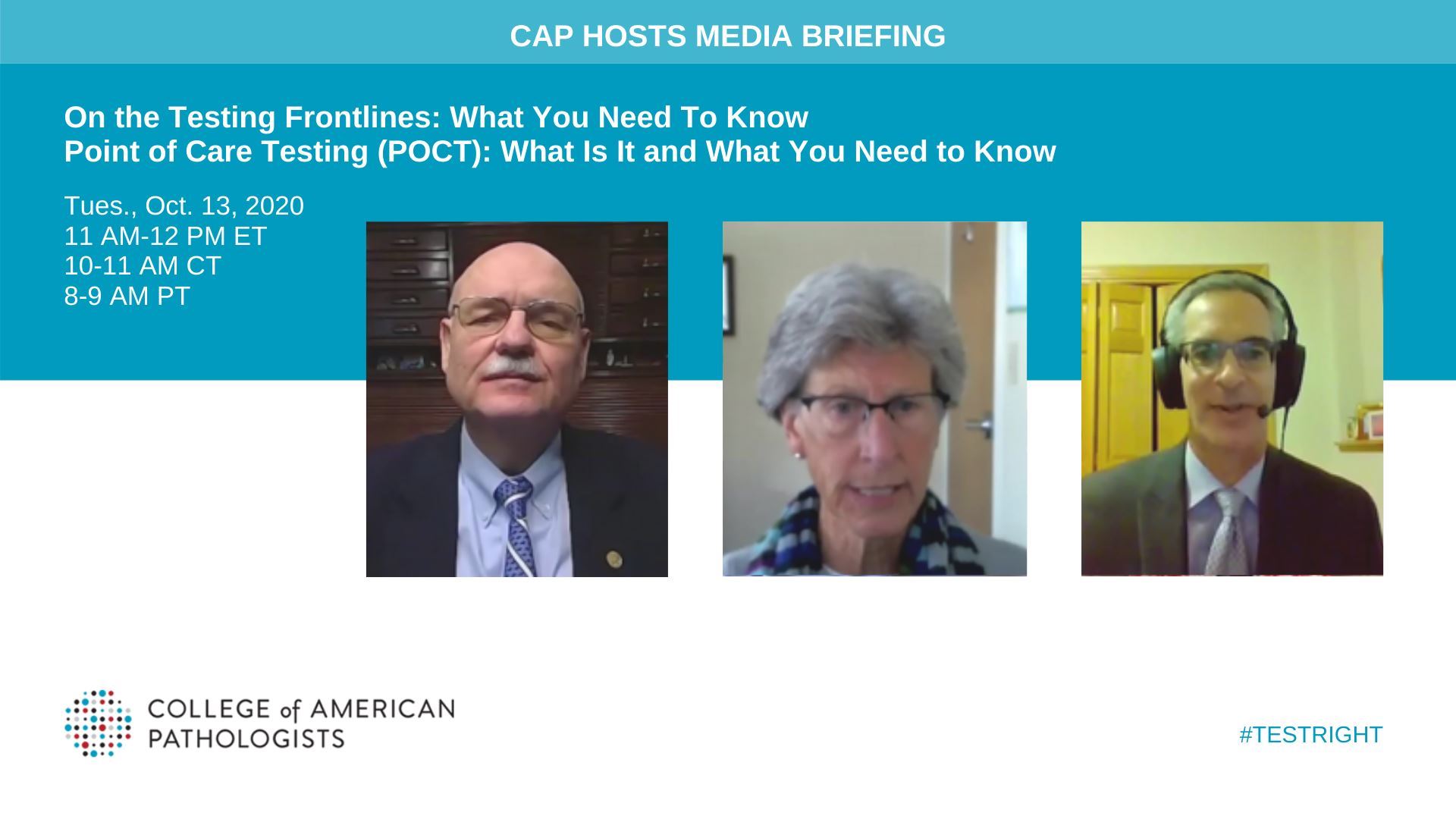NORTHFIELD, Ill.—The College of American Pathologists (CAP) hosted an On the Testing Frontlines: What You Need To Know national media briefing on Tuesday, Oct. 13 during its CAP20 Virtual Annual Meeting. Selecting presentation topics from the meeting, the CAP was able to put a face on testing and discuss current challenges and successes from community to urban lab environments, address the wide range of tests today and begin to chart where we go from here.
“This has been a landmark year on the pathology landscape,” says CAP President Patrick Godbey, MD, FCAP. “Our members and laboratories have excelled under extraordinary circumstances to address COVID-19 challenges, given the insurmountable demand on the role testing has had in reopening our country. We look forward to continuing this dynamic dialogue as we look ahead to new challenges and opportunities for our profession.”
The briefing included a Q/A with select speakers and based on presentation topics from the meeting.
To review the full briefing program including a transcript and video recording please visit: https://spaces.hightail.com/space/AbbYJ97gZQ/files
Dr. Godbey and all presenters are available for interview.
The full briefing agenda included:
Point of Care Testing (POCT): What Is It and What You Need to Know: Regulatory requirements, case histories, current challenges and benefits
- Point of care testing programs have the potential to improve patient outcomes, but also have more risks associated with them compared to central laboratory testing
- The role of pathologists in managing point of care testing programs to provide best quality of patient care and outcomes
Bradley S. Karon, MD, PhD, FCAP, chair, Division of Clinical Core Laboratory Services and professor of Laboratory Medicine and Pathology, Mayo Clinic, Rochester, Minnesota; has served as director or co-director of the Point of Care Testing program since 2004; recently elected to the CAP Board of Governors
Deborah A. Perry, MD, FCAP, medical director, Methodist Pathology, Omaha, Nebraska; former chair, CAP Point of Care Testing Committee
- Current and emerging methods, pitfalls and tradeoffs when it comes to testing
- Insight and knowledge of how COVID-19 testing has impacted everyday practice
- Comprehending the multiple testing options; understanding their accuracy and reliability
Benjamin Pinsky, MD, PhD, FCAP, medical director of the Clinical Virology Laboratory at Stanford Healthcare in Palo Alto, California and associate professor of pathology and of infectious diseases, Department of Pathology, Stanford School of Medicine
Christina M. Wojewoda, MD, FCAP, director, Clinical Microbiology Laboratory, University of Vermont Medical Center in Burlington; associate professor, University of Vermont Larner College of Medicine; vice chair, CAP Microbiology Committee
COVID-19 Impacts on CAP-Accredited Laboratories: Economic and Workforce challenges, current perspectives and unique challenges in smaller communities
Highlights from two CAP surveys of directors of CAP-accredited laboratories on:
- How many of those laboratories are conducting COVID19 testing and what kind of testing is being done
- What impediments are laboratories facing in providing testing, particularly in accessing testing supplies
- How the laboratory workforce is dealing with the challenges (economic and otherwise) of the COVID19 pandemic
The discussion also featured perspectives from two different settings—one a large academic hospital laboratory in Chicago, and the other a community hospital laboratory in Charleston, South Carolina
Kathleen G. Beavis, MD, FCAP, professor of pathology, Department of Pathology, the University of Chicago, overseeing the Microbiology and Immunology laboratories; trustee of the American Board of Pathology and former chair, CAP Microbiology Resource Committee
Joseph M. Sanfrancesco, MD, FCAP, community-based pathologist, Charleston, South Carolina; member, CAP Policy Roundtable Workforce Subcommittee and Economic Affairs Committee
Thomas M. Wheeler, MD, FCAP, W. L. Moody, Jr. Chair in Pathology; senior vice chair
Faculty Group Pathology Practice, Baylor College of Medicine in Waco, Texas; and chief of the pathology service at the Baylor St. Luke’s Medical Center in Houston’s Texas Medical Center
The COVID-Transformed Autopsy Service: Guidelines from the Front Lines
- Safety should be a priority when performing autopsies on COVID positive patients
- Safety during a COVID autopsy entails donning the proper PPE, performing the autopsy in a facility with the proper engineering controls and having in place the proper workplace practices
- Accurate and proper death certification provides a key tool for monitoring mortality surveillance to battle the COVID-19 pandemic. Without an autopsy, many suspected COVID-19 deaths may be inaccurately certified.
- The autopsy also has great importance in shaping policy and public health decisions
Harold Sanchez, MD, FCAP, assistant professor, Yale School of Medicine, pathologist in New Britain, Connecticut and affiliated with several area-wide hospitals
Jonathan Thompson, MD, FCAP, deputy state medical examiner for the State of Iowa; associate professor of Pathology, University of Iowa and adjunct assistant professor of Forensic Pathology, Des Moines University
Alex K. Williamson, MD, FCAP, chief of autopsy pathology, director of Northwell Regional Autopsy Service, and associate professor of Pathology & Laboratory Medicine at Zucker School of Medicine at Hofstra / Northwell Health in East Garden City, New York; member, CAP Autopsy Committee
About the College of American Pathologists (CAP)
As the world’s largest organization of board-certified pathologists with almost 18,000 members and as the leading provider of laboratory accreditation and proficiency testing programs, the CAP serves patients, pathologists, and the public by fostering and advocating excellence in the practice of pathology and laboratory medicine worldwide. Ninety-eight percent of the top 1,000 laboratories in the U.S. are CAP accredited. Pathologists oversee and provide laboratory testing and diagnose viruses, chronic diseases, cancers and other health conditions. For more information, visit yourpathologist.org to watch pathologists at work and see the stories of the patients who trust them with their care. Visit www.cap.org
# # #

